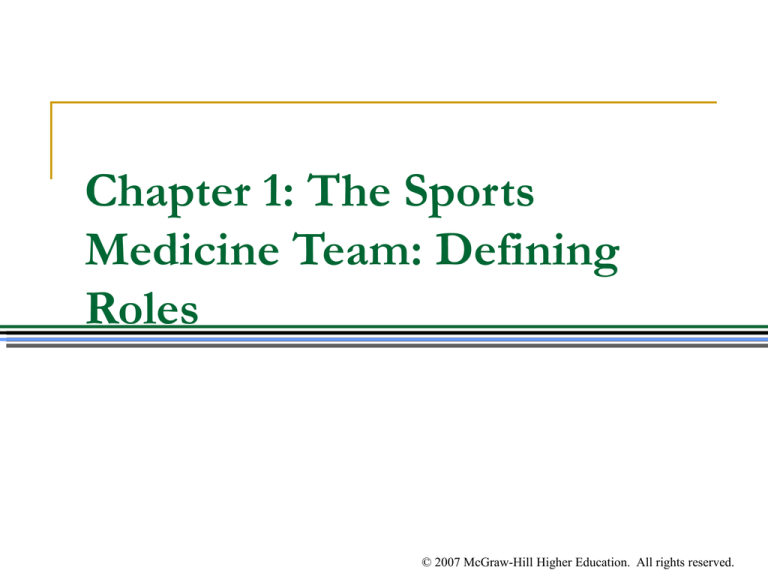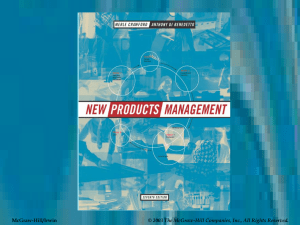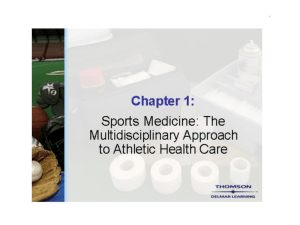
Chapter 1: The Sports
Medicine Team: Defining
Roles
© 2007 McGraw-Hill Higher Education. All rights reserved.
Injury is a part of athletics
Athletes have a right to expect that those who
are overseeing their particular sport view their
health and safety as a priority
Critical to have individuals that are aware of
both treatment and prevention
This is where the Athletic Trainer (ATC) comes
in
__________________________________________
__________________________________________
__________________________________________
__________________
© 2007 McGraw-Hill Higher Education. All rights reserved.
What Is Sports Medicine ?
Sports medicine refers to a broad field of
medical practices related to physical
activity and sport
Defined by American College of Sports
Medicine (ACSM) as multidisciplinary
Clinical application in these areas is aimed at
improving and maintaining functional
capacities for physical activity
Sports medicine generally focuses on
areas of __________________________
_________________________________
© 2007 McGraw-Hill Higher Education. All rights reserved.
Human
Performance
Injury
Management
Exercise Physiology
Practice of Medicine
Biomechanics
Sports Physical Therapy
Sport Psychology
Athletic Training
Sports Nutrition
Sports Massage
© 2007 McGraw-Hill Higher Education. All rights reserved.
Sports Medicine Organizations
Sports medicine organizations tend to have many
goals
Upgrade field by devising and maintaining a set of
professional standards (code of ethics)
Bring professionals together in collegial fashion for
exchange of ideas, critical thinking and research for
advancement of profession
____________________________________________
________________________________________
Many national organizations have state and local
associations, serving as extensions of the larger
body
© 2007 McGraw-Hill Higher Education. All rights reserved.
Historical Development of Sports
Medicine Organizations
•International Federation of Sports Medicine (1928)
•American Academy of Family Physicians (1947)
•National Athletic Trainers Association (1950)
•American College of Sports Medicine (1954)
•American Orthopaedic Society for Sports Medicine (1972)
•National Strength and Conditioning Association (1978)
•Sports Physical Therapy Section of APTA (1981)
•NCAA Committee on Competitive Safeguards and Medical
Aspects of Sports (1985)
© 2007 McGraw-Hill Higher Education. All rights reserved.
THE ATC
Read Box 1-2; p.13
Must graduate from an approved CAATE
program
Certified by NATABOC
Licensed in most states
Professional associations: NATA, MAATA
and VATA
CEUs – What are they?
1 CEU per contact hour
How do we gain CEUs?
© 2007 McGraw-Hill Higher Education. All rights reserved.
The Primary Members on the
Sports Medicine Team
Team Physician, ATC, Coach and Athlete
© 2007 McGraw-Hill Higher Education. All rights reserved.
Requires a group effort to be most
effective
Involves a number of individuals
Each member of the team must perform
specific functions relative to caring for the
injured athlete
Each member of the team who cares for
athletes should be 1st aid/CPR certified
© 2007 McGraw-Hill Higher Education. All rights reserved.
Responsibilities of the Team
Physician
Athletic trainer works under direct supervision of
physician
Physician assumes a number of roles
__________________________
Resource for other team members
Diagnoses all injuries
Physician and ATC must be able to work together
___________________________________
© 2007 McGraw-Hill Higher Education. All rights reserved.
© 2007 McGraw-Hill Higher Education. All rights reserved.
Compiling medical histories and
conducting physical exams
Deciding on disqualifications
____________________________
Physician must have the final say on when the
athlete should return to activity
___________________________
It is imperative that the team physician
promote and maintain consistently high
quality care
© 2007 McGraw-Hill Higher Education. All rights reserved.
Roles and Responsibilities of the
Athletic Trainer
_____________________________________
______________________________
_____________________________________
____________________________
May be employed in a variety of settings
Colleges/Universities/Secondary schools
Sports medicine clinics / Corporate settings
Amateur/Professional athletics
Military/NASA
Equipments sales/marketing
© 2007 McGraw-Hill Higher Education. All rights reserved.
© 2007 McGraw-Hill Higher Education. All rights reserved.
Must have extensive background in formal
academic preparation and supervised
practical experience
Guidelines are set Board of Certification
Both in academic coursework and clinical
experience
Upon meeting the educational guidelines
applicants are eligible to sit for the
examination
Upon passing the certification examination
= BOC certification as an athletic trainer
Credential of ATC
© 2007 McGraw-Hill Higher Education. All rights reserved.
Injury prevention
Ensure appropriate
training, monitor
environment, nutrition,
maintain & fitting
equipment, appropriate
use of medication
(Minimum of CPR and
First Aid)
Knowledge of equipment,
manual therapy, therapeutic
modalities
Organization &
administration
Recognition, evaluation,
assessment of injuries
Immediate care of
injuries and illnesses
Treatment, rehabilitation
and reconditioning
Budgeting, inventory, injury
records, supervision of
assistants and students,
dealing with insurance
matters
Professional responsibility
Educating the public through
seminars, research &
providing good care
© 2007 McGraw-Hill Higher Education. All rights reserved.
Role of the Coach in the Sports
Medicine Team
Coach must be aware of the
responsibilities of each individual
associated with the team
If there is no athletic trainer, this becomes even
more critical
__________________________________
__________________________________
All coaches should be certified in CPR1,2,3
and in basic First Aid1,2 (Red Cross1,
National Safety Council2 or American
Heart Association3)
© 2007 McGraw-Hill Higher Education. All rights reserved.
_________________
_________________
______________
Possess appropriate
coaching licenses and
certifications
Must provide high
quality and properly fit
protective equipment
Apply proper first aid
if necessary
_________________
_________________
_________________
____________
Continuing education
Function as a coach
_________________
_________________
__________
© 2007 McGraw-Hill Higher Education. All rights reserved.
Relationship Between the Sports
Medicine Team and Athlete
Primary concern should be that of the athlete
All individuals must work cooperatively in the best
interest of the athlete
________________________________________
________________________________________
__________________________
Close communication between all parties
involved is critical
© 2007 McGraw-Hill Higher Education. All rights reserved.
All parties must work to develop solid
working relationship
Each member will have to gain trust and
confidence in the skills and abilities of
each other
Imperative that the athlete is kept wellinformed
_____________________________________
_____________________________________
________________
© 2007 McGraw-Hill Higher Education. All rights reserved.
Other Members of the Sports
Medicine Team
• Physicians
• Dentist
• Podiatrist
• Nurse
• Physicians Assistant
• Sports Chiropractors
• Physical Therapist
• Massage Therapist
• Orthotist/prosthetist
•Parents
• Exercise Physiologist
• Biomechanist
• Nutritionist
• Sport Psychologist
• Emergency Medical
Specialists
•Equipment Personnel
•Strength and Conditioning
Coach
•Administration
© 2007 McGraw-Hill Higher Education. All rights reserved.
The Role of the Strength & Conditioning
Coaches in the Sports Medicine Team
_________________________________
Often employed at the collegiate level for both
team and individual training sessions
____________________________________
All strength & conditioning coaches should be
certified in CPR1,2,3 and in basic First Aid1,2
(Red Cross1, National Safety Council2 or
American Heart Association3)
© 2007 McGraw-Hill Higher Education. All rights reserved.
Must work with the athletic trainer when it
_____________________________________
_____________________________________
Strength & conditioning coaches are typically
not available at the high school level
__________________________________________
___________________________________
Will require both program development and
overseeing the weight room
© 2007 McGraw-Hill Higher Education. All rights reserved.
The Role of the Athletic
Administrator in the Sports
Medicine Team
Has a significant impact on the sports
medicine team
Responsible for hiring personnel
(_________________________________
__________________________________
____________________________)
Must be sure that all individuals have the
necessary credentials and are willing to work
as a team
© 2007 McGraw-Hill Higher Education. All rights reserved.
Must also oversee and develop policies &
procedures, risk management plan, and
emergency action plans
Responsible for the budget and funding all
aspects of an athletic healthcare program
____________________________________
Commitment of the administrator can have
a tremendous impact on the success of
the athletic program
© 2007 McGraw-Hill Higher Education. All rights reserved.
Family and the Sports Medicine
Team
Parents will also be involved at the high
school and junior high school level
Parent’s decision must be of a primary
consideration
Athletic trainer must be prepared to deal with
multiple healthcare providers at parents
request
May be dictated via parent’s insurance plan
© 2007 McGraw-Hill Higher Education. All rights reserved.




